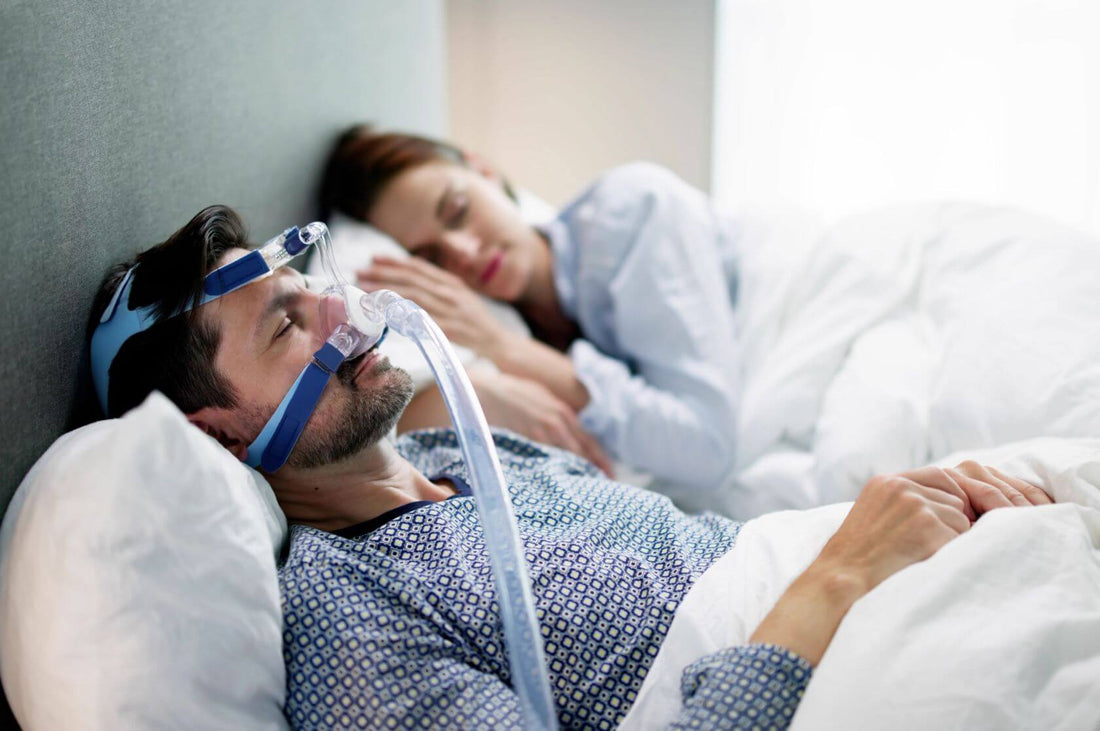We all know that diet plays a significant role in overall health. Did you know that it also has a substantial impact on sleep quality? Sleep apnea, characterized by repeated interruptions in breathing during sleep, can be worsened by being overweight and unhealthy eating habits.
In this article, we’ll explore the relationship between sleep apnea and diet, offering practical advice on how dietary changes can help alleviate symptoms.
The Impact of Diet on Sleep Apnea
Certain foods can exacerbate the symptoms of sleep apnea. Foods high in saturated fats and sugar, such as sweets and fast food, contribute to obesity and are major risk factors for sleep apnea.
Additionally, alcohol and coffee—especially when consumed in the evening—disrupt sleep and worsen sleep apnea. Smoking irritates the airways, further aggravating the condition.
Excess weight, particularly fat deposits around the neck, can obstruct the airways. A healthy, balanced diet and regular physical activity are highly recommended to manage weight and improve sleep quality.
Which Foods Can Help Reduce Sleep Apnea Symptoms?
While some foods worsen sleep apnea, others can help alleviate its symptoms. Here are dietary recommendations for a healthier, more balanced approach:
-
Fruits and Vegetables: Rich in fiber and antioxidants, these foods promote better digestion, support weight management, and reduce inflammation, all of which help lower sleep apnea risks.
-
Lean Proteins: Chicken, turkey, and fish provide essential nutrients without saturated fats, reducing inflammation and supporting muscle maintenance while promoting fat loss.
-
Omega-3 Fatty Acids: Found in fatty fish like salmon, mackerel, and sardines, omega-3s have anti-inflammatory properties that reduce airway inflammation and improve nighttime breathing.
-
Magnesium- and Potassium-Rich Foods: Dairy products like yogurt and skimmed milk, as well as leafy greens, contribute to muscle relaxation and better sleep without the drawbacks of full-fat dairy.
Foods to Avoid for Better Sleep Apnea Management
Some foods and beverages should be avoided as they can worsen sleep apnea symptoms. These include:
-
Saturated Fats: Found in red meat, full-fat dairy, and fried foods, these increase inflammation and weight gain, aggravating sleep apnea.
-
Refined Sugars: Sugary snacks, cakes, biscuits, and sodas contribute to weight gain and disrupt sleep cycles.
-
Alcohol: Alcohol relaxes airway muscles, increasing the likelihood of nighttime breathing interruptions. It’s best to reduce or avoid alcohol, especially in the evening.
-
Caffeine: Coffee and other caffeinated drinks are stimulants that can interfere with sleep. Limiting caffeine consumption in the late afternoon and evening is recommended.
-
Full-Fat Dairy: These products can increase mucus production, which may obstruct airways during sleep.
The Role of Diet in Weight Management and Sleep Apnea
Obesity is a significant risk factor for sleep apnea, contributing to snoring and breathing interruptions. Fat accumulation in the neck, throat, and abdomen can block airflow during sleep.
To combat sleep apnea, consider using devices designed to address apnea and snoring. Additionally, adopting certain diets has been shown to improve sleep quality and reduce unpleasant snoring:
Mediterranean Diet
Rich in anti-inflammatory foods like vegetables, fruits, whole grains, nuts, and fatty fish, this diet supports weight loss and includes healthy fats from fish and vegetable oils, while limiting saturated fats.
Plant-Based Diet
Focusing on fruits, vegetables, legumes, nuts, seeds, and fiber-rich foods, this diet reduces inflammation and limits consumption of animal products high in saturated fats, which helps alleviate sleep apnea symptoms.
Sugar- and Saturated Fat-Free Diet
Reducing refined sugars and saturated fats directly improves sleep quality and reduces sleep apnea symptoms. Avoid sugary drinks, which contribute to weight gain and increase airway pressure.
Healthy Eating Habits for Better Sleep
Beyond following a diet, adopting healthy eating habits and maintaining a balanced lifestyle are crucial for managing sleep apnea:
Meal Timing
Avoid heavy evening meals, as they can disrupt sleep. Instead, opt for earlier and lighter dinners.
Hydration
Stay hydrated throughout the day to support overall health and restorative sleep. Avoid excessive fluid intake in the evening to minimize nighttime awakenings.
Limit Alcohol Consumption
Reducing alcohol intake is essential for managing sleep apnea. Alcohol, particularly in the evening, relaxes airway muscles, increasing the risk of respiratory pauses. Smoking also irritates the airways and worsens symptoms.
Conclusion
To manage sleep apnea effectively, maintaining a healthy lifestyle and adopting better eating habits can make a significant difference. A balanced diet, along with appropriate treatments following a precise diagnosis, can greatly reduce sleep apnea symptoms and improve overall health.
FAQ
Which foods should be avoided for sleep apnea?
Avoid saturated fats, sugars, and heavy evening meals. Instead, focus on fruits, vegetables, seeds, and lean proteins.
Is banana good for sleep apnea?
Yes, bananas contain magnesium, which promotes muscle relaxation and a restful sleep.
Does sleep apnea make you hungry?
Sleep apnea can cause fatigue and increased appetite due to hormonal changes, often leading to weight gain.
How can sleep apnea be prevented
Maintain a balanced diet, adopt healthy habits, limit alcohol and sugar, and engage in regular physical activity to significantly reduce sleep apnea symptoms.








